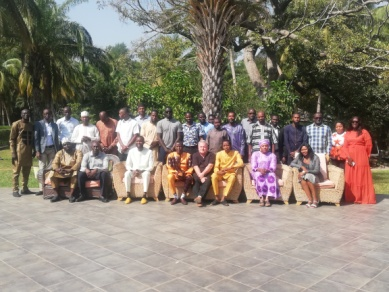By Madiba Singhateh
The National Environment Agency and partners trained Nation on Thursday, 18th January 2024 trained National Assembly members on the State of Implementation of the GEAP III at Kanilai.
The National Assembly members were trained on the State of Implementation of the GEAP III, Current state of the Environment, the Coastal Zone Bill 2023, Management and Strategic plans and other important environmental instruments.
The training also included providing them with detailed knowledge on the working nature of the agency in relation to the various projects, as well as the challenges they face in their regulatory mandate and the decisions they make on environmental issues.
The NAMs, who benefitted from the one-day training are the members of the Select Committees on the Environment and Health and the Chairpersons of other select committees.
Essa Conteh, the deputy chairperson of the Environment Select Committee said:
“I just want to assure you that the National Assembly of the Gambia will be fully behind you because what you do is to protect us and our environment. In doing so as National Assembly members, we should be there as your ambassadors to ensure that environmental issues are addressed including all other environmental problems we now face,” he said.
In his opening statement, NEAdirector Dr.Dawda Badjie, said the issue ofthe environment is everyone’s business and that the NEA are charged with the responsibility of managing the environment. He said a degraded environment does not spare the polluter or the recipient, because all of them are part and parcel of the environment. He called on people to work together to protect the environment as a vital component of sustainable development which led to the establishment of the Agency.
“All of us present here agree that the environment that supports our own existence is under serious threat, and the perimeters of these threats include climate change which is much talked about now, biodiversity loss, deforestation, waste management, chemical misuse, land degradation, air pollution, and coastal zone degradation among others. All these have a negative impact on environmental health and the quality of life for humans and other creatures,” he said.
Speaking further, Mr Badjie said the objectives of the workshop is to strengthen their knowledge on environmental issues and the role of the NEA, as mandated by several laws.The Gambia,he said, has done a lot in terms of addressing environmental issues and hassigned lots of international and regional agreements, but said the problem lies in the implementation of these laws. He said the role of NAMs is to enact laws in the interest of the people, and in doing this, they are protecting everyone, including their families.
Heiko Seilert, project assistant and Abubacarr Kujabi, project coordinator of GCCA+, both harped on the importance of the draft Integrated Coastal Zone Management bill, and said the overall aim of the project is to increase climate resilience of coastal marine zones of the country. Theyconcluded that when they talk about an 80-kilometer coastline, they donot only mean the coastal area only but the river banks ae well.


















